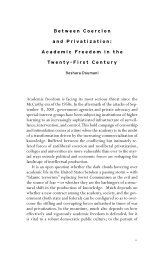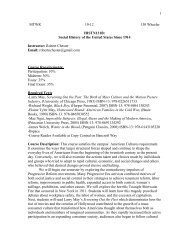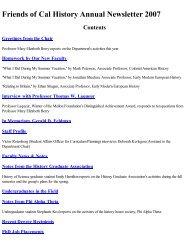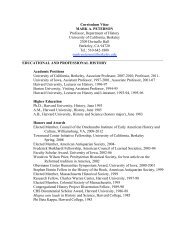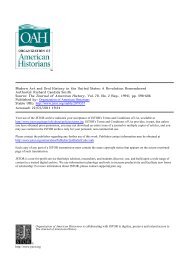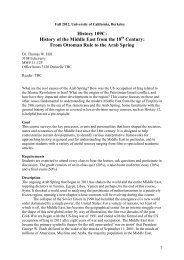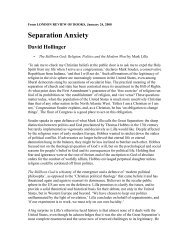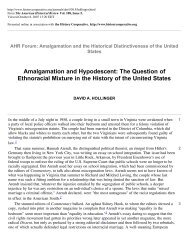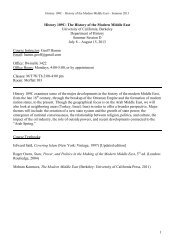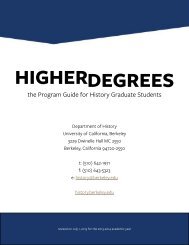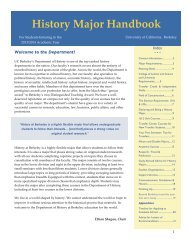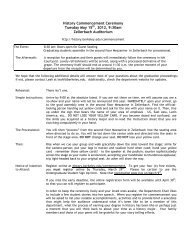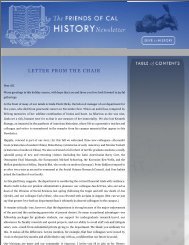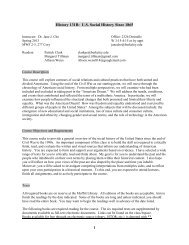My Grandmother and Other Stories: Histories of the Palestinians as ...
My Grandmother and Other Stories: Histories of the Palestinians as ...
My Grandmother and Other Stories: Histories of the Palestinians as ...
You also want an ePaper? Increase the reach of your titles
YUMPU automatically turns print PDFs into web optimized ePapers that Google loves.
War Diaries: Mersin <strong>and</strong> Jerusalem<br />
Second Lieutenant Muhammad al-F<strong>as</strong>ih <strong>of</strong> Mersin <strong>and</strong> Private Ihsan al-Turjman from<br />
<strong>the</strong> old city <strong>of</strong> Jerusalem came from distant sides <strong>of</strong> <strong>the</strong> Arab provinces <strong>of</strong> <strong>the</strong> Ottoman<br />
Empire to join <strong>as</strong> soldiers in <strong>the</strong> Sultan’s army, <strong>the</strong>reby encapsulating <strong>the</strong> manner in<br />
which <strong>the</strong> Great War transformed <strong>the</strong> lives <strong>of</strong> its citizens in two different directions–<br />
immersion into Republican Turkish nationalism for one, <strong>and</strong> Arab separatism for <strong>the</strong><br />
o<strong>the</strong>r.<br />
What w<strong>as</strong> common to al-F<strong>as</strong>ih <strong>and</strong> Turjman w<strong>as</strong> that <strong>the</strong>y both kept a daily record<br />
<strong>of</strong> <strong>the</strong>ir war experiences, <strong>and</strong> in so doing preserved for posterity a vivid narrative <strong>of</strong><br />
<strong>the</strong> great divide that separated <strong>the</strong> communitarian, multi-ethnic, imperial domain <strong>of</strong><br />
<strong>the</strong> end <strong>of</strong> <strong>the</strong> nineteenth century from <strong>the</strong> nationalist era <strong>of</strong> <strong>the</strong> post WWI period.<br />
Both soldiers were born around 1893 15 , <strong>and</strong> both were conscripted in July 1914 after<br />
<strong>the</strong> declaration <strong>of</strong> seferberlik, <strong>the</strong> general mobilization that brought Turkey into <strong>the</strong><br />
war alongside Germany <strong>and</strong> <strong>the</strong> Central Alliance against Western Allies. Both came<br />
from middle or mercantile cl<strong>as</strong>ses. F<strong>as</strong>ih’s fa<strong>the</strong>r w<strong>as</strong> a customs clerk, while <strong>the</strong> elder<br />
Turjman w<strong>as</strong> an old city merchant from a l<strong>and</strong>ed family that had lost <strong>the</strong> bulk <strong>of</strong> its<br />
wealth. 16<br />
Two ordinary soldiers serving in <strong>the</strong> same imperial army <strong>and</strong> writing a daily diary<br />
is a unique phenomenon for this period <strong>of</strong> m<strong>as</strong>s illiteracy. For <strong>the</strong>se diaries to have<br />
survived <strong>and</strong> come to light almost a century after <strong>the</strong> event is quite exceptional, for<br />
even among <strong>the</strong> elite literati very few ventured to record <strong>the</strong>ir observations, <strong>and</strong> even<br />
fewer <strong>of</strong> those records became available to <strong>the</strong> public. The narratives <strong>of</strong> al-F<strong>as</strong>ih<br />
<strong>and</strong> Turjman are particularly valuable in that <strong>the</strong>y recorded <strong>the</strong> impact <strong>of</strong> <strong>the</strong> war on<br />
<strong>the</strong>ir society, on <strong>the</strong>ir own psychological transformations, <strong>and</strong> <strong>the</strong> trauma it produced<br />
among <strong>the</strong>ir <strong>of</strong>ficers <strong>and</strong> comrades.<br />
Unlike Turjman, who reveals that he spent <strong>the</strong> war years ‘playing with my moustache’<br />
<strong>and</strong> using all his skills <strong>and</strong> family connections to evade being sent to <strong>the</strong> sou<strong>the</strong>rn<br />
front in Suez, Muhammad al-F<strong>as</strong>ih w<strong>as</strong> a decorated soldier who fought courageously<br />
in Gallipoli–<strong>and</strong> later in Gaza <strong>and</strong> Beersheba. He had little hesitation in sacrificing his<br />
life for <strong>the</strong> Sultan <strong>and</strong> his Ottoman homel<strong>and</strong>. More significant, <strong>the</strong> two diaries show<br />
that <strong>the</strong> Great War, at le<strong>as</strong>t in its early ph<strong>as</strong>es, w<strong>as</strong> able to comm<strong>and</strong> a considerable<br />
loyalty from its Turkish <strong>and</strong> Arab citizens alike.<br />
The contr<strong>as</strong>ting lives <strong>of</strong> <strong>the</strong> two soldiers are equally intriguing when we consider <strong>the</strong><br />
complexity <strong>of</strong> <strong>the</strong> ethnic dimension that coloured <strong>the</strong>ir lives. The Turjman family w<strong>as</strong><br />
an Arabized family, possibly <strong>of</strong> Turkish descent, who settled in Palestine, while <strong>the</strong><br />
Arabness <strong>of</strong> al-F<strong>as</strong>ih is questionable, <strong>and</strong> can be gleaned with difficulty from his diary.<br />
Even though he wrote in Ottoman Turkish, his text is full <strong>of</strong> Arabic usages which gave<br />
Jerusalem Quarterly 30 [ 33 ]



